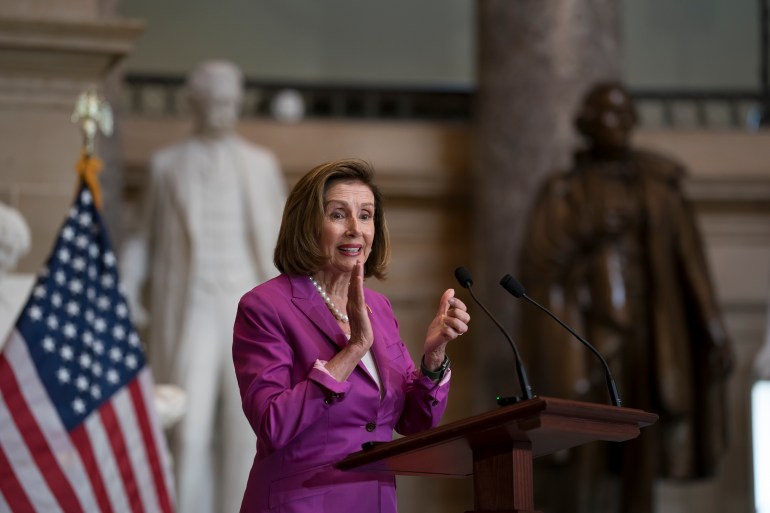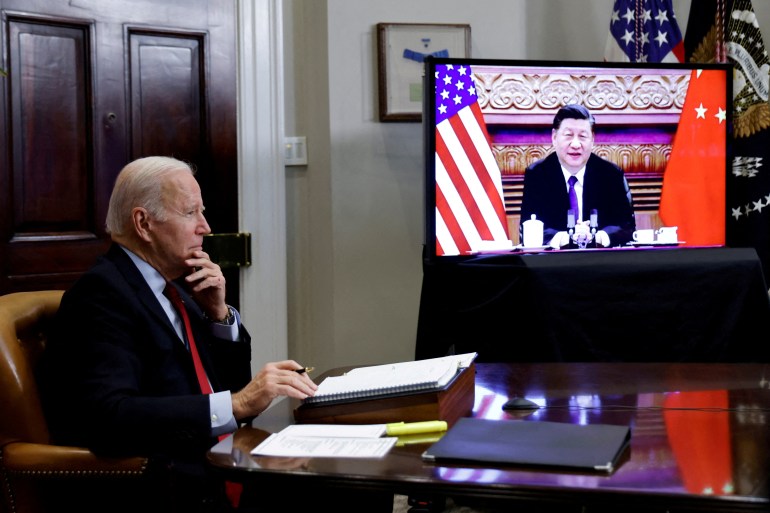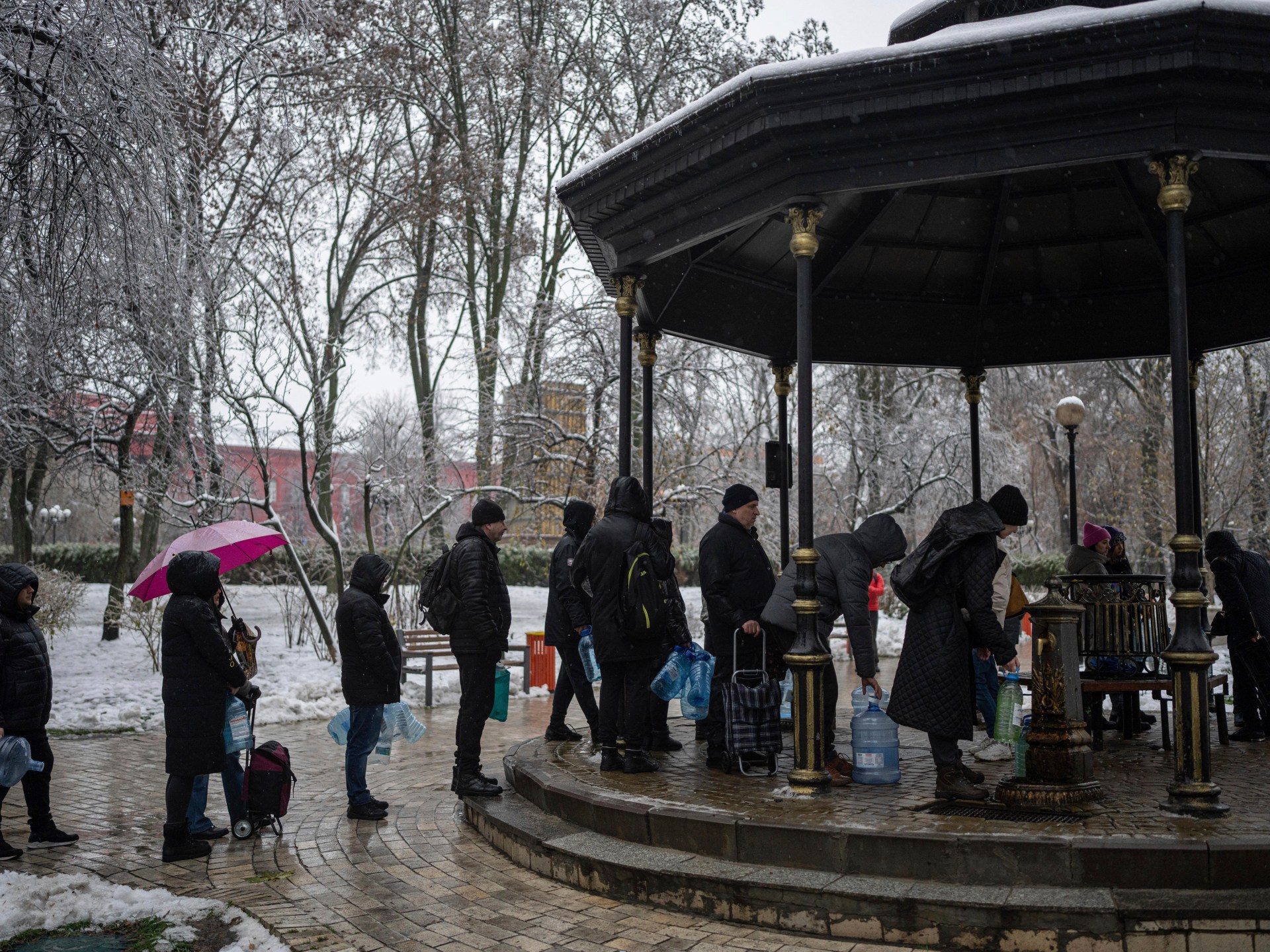Biden, Xi hold fifth call of their presidencies amid tensions | Joe Biden News
Relations between China and the US are being strained by talk of US House Speaker Nancy Pelosi’s potential trip to Taiwan.
United States President Joe Biden has spoken with his Chinese counterpart Xi Jinping, the fifth call of their presidencies, as the two leaders chart the future of their complicated relationship at a time of simmering economic and geopolitical tensions.
The call, which lasted over two hours on Thursday, comes as Biden aims to find new ways to work with the rising global power as well as strategies to contain China’s influence around the world. Differing perspectives on global health, economic policy and human rights have long tested the relationship — with China’s refusal to condemn Russia’s invasion of Ukraine adding further strain.
The latest pressure point has been US House Speaker Nancy Pelosi’s potential visit to Taiwan, the island that governs itself democratically and receives informal defensive support from the US, but which China considers part of its territory. Beijing has said it would view such a trip as a provocation, a threat US officials are taking with heightened seriousness in light of Russia’s incursion into Ukraine.

“If the US insists on going its own way and challenging China’s bottom line, it will surely be met with forceful responses,” Zhao Lijian, a spokesperson for China’s Foreign Ministry, told reporters earlier this week. “All ensuing consequences shall be borne by the US.”
Pelosi would be the highest-ranking US elected official to travel to Taiwan since Republican Newt Gingrich visited the island in 1997 when he was House speaker. Biden last week told reporters that US military officials believed it was “not a good idea” for the speaker to visit the island at the moment.
John Kirby, a US national security spokesman, said Wednesday that it was important for Biden and Xi to regularly touch base.
“The president wants to make sure that the lines of communication with President Xi remain open because they need to,” Kirby told reporters at a White House briefing. “There are issues where we can cooperate with China on, and there are issues where obviously there are friction and tension.”
Biden and Xi last spoke in March, shortly after the Russian invasion of Ukraine.
“This is one of the most consequential bilateral relationships in the world today, with ramifications well beyond both individual countries,” Kirby said.
The conversation comes as Biden has moved to shift US reliance off Chinese manufacturing, including the Senate’s passage Wednesday of legislation to encourage semiconductor companies to build more high-tech plants in the US. Biden wants to marshal global democracies to support infrastructure investments in low- and middle-income nations as an alternative to China’s “Belt and Road Initiative”, which aims to boost Chinese trade with other global markets.
Biden – who has kept in place tariffs on many Chinese-manufactured goods from the era of former US President Donald Trump in order to maintain leverage over Beijing – is weighing whether to ease at least some of them in a move to lessen the impact of soaring inflation on American households.

Some analysts believe Xi also has an interest in avoiding escalation as he seeks an unprecedented third term in office at a congress of China’s ruling Communist Party expected in the fall.
Scott Kennedy of Washington’s Center for Strategic and International Studies said he did not believe the two sides were on the edge of a crisis, but “the risk of a major crisis is well above zero” and a Biden-Xi call was important to avoid an unwanted clash.
“Beijing, Taipei and Washington are full of people steeped in how to send and interpret signals conveying threats and reassurance, and I’m sure no one wants a war right now,” Kennedy told Reuters news agency.
US officials have also criticised China’s “zero-COVID” policy of mass testing and lockdowns in an effort to contain the spread of COVID-19 in its territory, labelling it misguided and fretting that it will further slow global economic growth.
Other points of strain include China’s treatment of Uighur Muslims, which the US has declared a genocide, its militarisation in the South China Sea, and a global campaign of economic and political espionage.





Pingback: kaws rocks | crumpets vape | guava gas strain |springfield farms carts | dmt vape uk | curepen legend og | mad river melts | buy dmt vape pen |kaws rocks weed | boutiq vapes |glo extracts | kaws weed | georgia pie strain
Pingback: Noord-Brabant Limburg Zeeland Online medicatie kopen zonder recept bij beste Benu apotheek alternatief
Pingback: ดูซีรี่ย์ออนไลน์